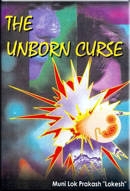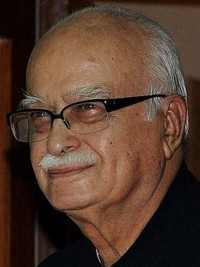
Message From Shri Lalkrishna Advani
Leader Of Opposition, Lok Sabha, India
The novel "The Unborn Cruse" authored by Muni Shri Lokprakash 'Lokesh' presents in a very powerful, impact-worthy and genuine manner social inconsistencies, political hypocrisies and human distortions. This novel, written with the background of increasing incidence of female foeticide is a very meaningful and lively presentation through which a call has been given for getting the humanity freed from the slur of female foeticide.
Through his novel, Muni Shri Lokeshji has brought out complicated situations arising out of growing imbalance in male-female sex ratio. This has encouraged tendencies of.polygamy, coercive marriages, rape, cruelty and violence. If this distorted thinking and selfish mentality is not restrained, it is feared that female foeticide may develop into a tradition, which will harm the humanity not only in this but for many centuries to come. Who will be able to checkmate these distortions?
Indian culture has provided the base for promoting non-violence, compassion and co-existence. It is, therefore, astonishing how in our country the horrible practice of female foeticide is finding a fertile ground. What a shameful mindset it is, which makes people sad about even the prospect of the birth of a daughter. And what an easy way to opt for it by simply killing the female embryo. What is tragic is that female foeticides and abortions are going on openly. The development of medical techniques has been for protecting the existence of human life. When Medical Science tries its level best to save human life, how come it is being used to kill an unborn child in its embryo. This is undesirable from the humane angle. Does the unborn not have a right to life? What has that innocent soul done by way of harm to anyone. While on the one hand it is a bankruptcy of Governmental thinking to consider abortion as legal in order to control the growth of population, on the other female foeticide is an expression of a distorted human mindset. No faith, no science of ethics and social science could ever permit it.
Muni Lokeshji has analysed at great length the reasons leading to female foeticide in his novel. He holds evils like dowry and rape and lack of education as responsible for it. Along side he considers that the so called modern thinking and modernity is also a very important reason for the spread of this disease. It is true that one finds this disease prevalent in novo-rich and highly modern families. Lest it becomes a mass disease, it is essential to embark upon arousing public awareness against it. Religious leaders could play an important role along with the Government.
In the countries of the developing world, and particularly so in our country, we have become accustomed to link all the good things with a son, and all the bad things with a daughter. A boy earns, becomes a support to his parents in their old age, and is instrumental in the continued growth of the family. Without a son, it is said that the parents will not get their salvation. Without a son, a family does not get respect in the society. These are the narrow considerations or misleading attractions which make people induce a married couple to beget a son at any cost. On the other hand it is said that a daughter is some one else's property and she imposes obligations like bringing her up under protection till her marriage, spending on her education, finding a suitable husband for her, meeting all the demands of the bridegroom's family and continuing to cater to further demands from her in laws well after the marriage. In order to free themselves from all such obligations, parents resort to female foeticide.
In his life time, Acharya Tulsi undertook effective efforts to control increasing incidence of the case female foeticide. Presently Acharya Shri Mahaprajna is endeavouring, through the medium of Ahimsa Yatra, to bring about a change from this violent mentality. Both these great persons have been able to shake and stimulate people's consciousness for attitudinal change in thinking.
The reality is that sex determination test methods are becoming inhuman. The investigation of hereditary diseases is being used more for ascertaining sex of the embryo. If by chance found to be a female embryo, then it runs the risk of being eliminated. If in this age of science, we do not change these false and misleading notions about boys and girls, when would we ever do it? If a boy is born with his luck, should it mean that a girl has no luck? In the country of Mahavir, Buddha and Gandhi, this manifestation of violence and cruelty is a mockery of Indian culture. Restrictions are in force on female foeticide in the form of restrictions on sex determination of the embryo. But until and unless people change their mentality and attitude, newer escape routes would be found.
The novel, "The Unborn Curse" provides a very powerful stimuli to change people's attitudes and mentality. Efforts should be made to see that this novel is read by all sections of the society. The Government could also usefully coordinate action with creative and constructive organizations so that the message of the novel could reach the masses.
The novel, "The Unborn Curse" has been written in a smooth-flowing and simple language and with a natural style. With its sensitivity and human touch, the novel would continue to inspire the people in a unique way for a long time.
Muni Lokeshji is a sensitive poet, a thinker and a revolutionary saint. The facility and ease with which he has characterized current distortions, hypocrisy, critical social situations and the conveniently compromising modern way of thinking, compels one to ponder over these matters. Hence, while this novel offers on the one hand important material for research and analysis, on the other even more importantly it offers a new form of story-telling, which will attract the readers to go through it with keen interest and curiosity.
Lalkrishna Advanj
 Lalkrishna Advani
Lalkrishna Advani